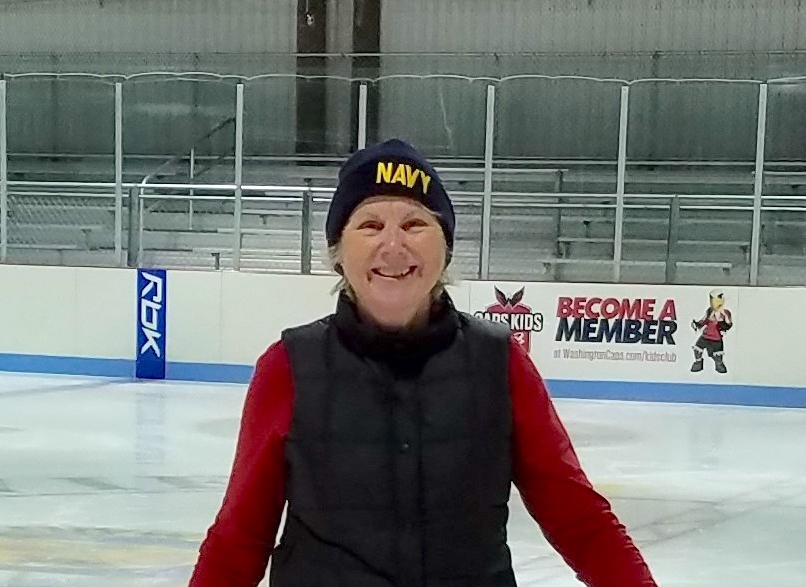Amy, by Jo Ann McCann
By Jo Ann McCann
Ice skating at our local rink is something I enjoy. It is great exercise and during the day the Free Skate sessions are relatively devoid of crowds. But when the rink is offering classes for beginners in a learn-to-skate program, there are lots of moms and kids on the ice for an 8-week session. The ice rink takes on the aura of a three-ring pre-school circus. Fortunately, I don’t have to work my way through this frenzied crowd. The rink managers have sectioned off a greater portion of the rink with traffic cones for skaters like me who just want some exercise.
As I make my turns around the rink, I watch the young skaters with interest. I can see the instructors putting the skaters in groups, the absolute beginners who are yet unmoving on the ice, the ones who can stand up and have a little bit of forward momentum, the ones who can go forward and maybe stop, and the ones who have mastered the basics and want to get their Pre-Alpha certificate. This frenzy is all very entertaining to watch. Kids do what they do best. They move, slow at first, they fall, they cry, they laugh, and they do it all over again.

After the half-hour class is over, the rink manager puts the cones away, and the rink becomes a free-for-all. Moms are on the ice now with the little ones, skating with them, helping them to stay upright, getting them moving, and cheering them on. I keep my eyes on the ones who can get going fast, but don’t know how to stop yet. They have no fear; but they share it with others.
As I continue skating, I watched one mom trying to get her timid teen to move a little bit and figure out how to glide instead of pushing off with one skate as if she were riding a scooter. The girl was obviously terribly afraid of falling. Because I am often at the rink and skate fairly well, I sometimes assist new skaters. I introduced myself to the pair and asked the mom if she would like some help. I suggested that I could hold her daughter’s other hand to help keep her upright to build her confidence. The mom breathed a sigh of relief and said that her daughter, Amy, was just learning to skate and was completely blind.
Mom said that Amy was adopted from China, where orphans were warehoused with seniors and were beaten for bumping into them. Canes were not allowed, so she soon learned to navigate by echolocation, which is very difficult in a noisy ice rink. Because of other medical issues, Amy was still black and blue from falling so much in her class last week. Obviously, building Amy’s confidence was the main goal in learning to relax and to enjoy skating. We successfully completed a lap or two around the rink before that session was over. It was a good start, but I found that I had a lot to think about.
Before the next session, I met with Donna, the rink manager, and asked if we could fit Amy with some of the hockey gear that I knew the rink had stashed away (padded pants, shin guards, and elbow protection) so she wouldn’t have to worry about falling. (Amy already had her own helmet, which was required for all beginners.) Mom and Amy both thought protective gear was a great idea. We got her fitted in her new gear and sent her out on the ice. When she fell for the first time with her gear on, she slid a distance and suddenly laughed. Although she was surprised to find herself down on the ice, she found that falling didn’t hurt anywhere! We knew we were headed in the right direction. Each week after that, Amy geared up for class and then worked with mom and me afterward.
To give Amy an idea of what was possible on ice skates, Amy’s mom and I tried taking Amy for a fast skate around the rink hand in hand. The first time we did this, Amy threw her head back and laughed and said, “I can feel the wind!”
Amy learned to do swizzles and snowplow stops and to skate fast on her own and earned her first skating certificate. She would follow her mother’s voice or mine around the rink while listening for the change in sound in the corner of the rink to know when to turn. When she occasionally bumped into someone, and they barked “What’s the matter, you blind?”, she would laugh and say “Yes!” Although Amy may have more challenges in the future, Amy has come a long way in meeting those challenges, and we are proud of her. The lesson for everyone: You never know what you can do until you try!
